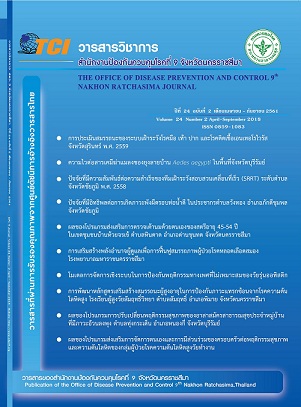The Empowerment of Caregivers for Rehabilitation of Stroke Patients at Maharat Nakhon Ratchasima Hospital
Keywords:
Empowerment of Caregivers for Rehabilitation of Stroke Patient, Health, Social SupportAbstract
This action research aimed to achieve the caregivers’ empowerment in rehabilitation and
help them combine and apply their skills and knowledge on practice to stroke patients, and focusing
on the results of empowerment program, at Maharat Nakhon Ratchasima Hospital. This study was
conducted during March to May 2017, and consisted of 3 stages: 1) situation analysis of the
rehabilitation after stroke, 2) developing self empowerment program concepts self empowerment
(Gibson, 1993), and 3) evaluation the effif icacy of the program after fif inishing by perceived self
empowerment questionnaires. Using purposive sampling, 30 patient-caregiver pairs, 4 physiotherapists,
and 1 physiatrist were invited to participate in the study, completing a set of questionnaires, in pre-post
empowerment program, including baseline characteristics, skills and knowledge on practice to stroke
patients, caregiver perception of self-empowerment, and activities of daily living performance in stroke
patients. Data were analyzed by descriptive statistics: frequency, mean, standard deviation, min,
max, paired sample t-test, and content analysis After the developing self empowerment program,
the caregivers can combine and apply their skills and knowledge on practice to stroke patients,
their skill, knowledge, perception on self empowerment, and Barthel ADL Index of stroke patients
were statistically signif ificant higher than that before (p<0.05). The Results of the developing founded
that after the development : caregivers had the knowledge, skill, self-power and Barthel ADL Index
of stroke patients statistically significant higher than that before the development (p<0.05).
References
:นนทบุรี, 2554
2. สำนักงานสาธารณสุขจังหวัดนครราชสีมา. รายงานประจำปี 2551. นครราชสีมา: โคราชพริ้นติ้ง, 2551.
3. โรงพยาบาลมหาราชนครราชสีมา. ข้อมูลสถิติผู้ป่วยโรคหลอดเลือดสมอง. กรุงเทพมหานคร: สำนักปลัด
กระทรวงสาธารณสุข, 2559
4. สถาบันประสาทวิทยา กระทรวงสาธารณสุข. รายงานการศึกษาเพื่อพัฒนาระบบทางการแพทย์ระดับตติยภูมิ
และสูงกว่าด้านโรคหลอดเลือดสมอง. กรุงเทพมหานคร: โรงพิมพ์องค์การสงเคราะห์ทหารผ่านศึก, 2552
5. Gibson, C.H.A Study of Empowerment in Mothers of Chronically Ill Children. Journal of Advanced
Nursing. 1993 ; 21(2) : 865-871.
6. ปิยนุช ภิญโย, กิตติภูมิ ภิญโญ, เพชรไสว ลิ้มตระกูล. การพัฒนาการดูแลผู้ป่วยโรคหลอดเลือดสมอง
โดยการมีส่วนร่วมของชุมชนในบริบทภาคตะวันออกเฉียงเหนือ. วารสารสงขลานครินทร์. 2558;
35(2):93-111
7. สมคิด ปุณะศิริ, จินต์จุฑา รอดพาล, สมคิด ตรีราภี, วิราวรรณ จันทมูล. ผลของการใช้โปรแกรมการเสริมสร้าง
พลังอำนาจต่อความสามารถในการดูแลของผู้ดูแลผู้ป่วยโรคหลอดเลือดสมอง. วารสารกองการพยาบาล.
2552;36(3): 47-57
8. อรุณี ชาญชัย, นิ่มนวล ชูยิ่งสกุลทิพย์, ปิ่นนเรศ กาศอุดม. ผลของการใช้โปรแกรมการดูแลผู้ป่วยโรค
หลอดเลือดสมองต่อระดับความรู้และทักษะในการดูแลผู้ป่วย ระดับความสามารถในการปฏิบัติกิจวัตร
ประจำวัน อัตราการเกิดภาวะแทรกซ้อนและระดับความพึงพอใจในการดูแลตามโปรแกรมของผู้ดูแล/
ผู้ป่วยโรคหลอดเลือดสมองเฉียบพลันที่เข้ารับการรักษาในโรงพยาบาลระยอง. วารสารวิทยาลัยพยาบาล
พระปกเกล้า. 2557; 25(1): 78-89

Downloads
Published
How to Cite
Issue
Section
License
Articles published in the Journal of the Office of Disease Prevention and Control 9 Nakhon Ratchasima are the copyrighted property of the Office of Disease Prevention and Control 9 Nakhon Ratchasima.



